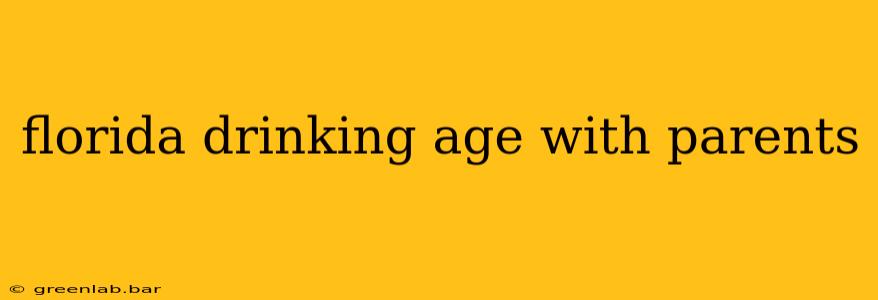The legal drinking age in Florida, like in all US states, is 21 years old. This applies regardless of whether you're with your parents, guardians, or any other adult. There are no exceptions to this law based on parental consent or supervision. This means that even if your parents are present and give permission, providing alcohol to a minor (anyone under 21) or allowing them to consume it is illegal in Florida and carries significant consequences.
Understanding Florida's Zero Tolerance Policy Regarding Underage Drinking
Florida takes underage drinking very seriously. The state operates under a zero-tolerance policy, meaning that any detectable amount of alcohol in a minor's system can lead to legal repercussions. This applies to driving under the influence (DUI) and simply possessing or consuming alcohol. Even if a minor is not driving, possession of alcohol can result in fines, community service, and even potential jail time. Parents who provide alcohol to minors face similar penalties.
Penalties for Underage Drinking and Parental Involvement
The penalties for underage drinking in Florida can vary depending on the circumstances, but generally include:
- Fines: Significant monetary penalties can be imposed on both the minor and the adult providing the alcohol.
- Community Service: This is a common consequence, requiring the individual to perform unpaid work for a set period.
- License Suspension/Revocation: For minors, this could impact driving privileges. Adults face similar penalties if they are driving under the influence.
- Court Appearances: Court costs and legal fees can add to the overall financial burden.
- Jail Time: In more serious cases, especially repeat offenses or those involving accidents or injuries, jail time is a possibility.
- Alcohol Education Programs: Mandatory participation in alcohol awareness and education programs is often required.
Parental Responsibility and the Law
Parents in Florida have a significant legal responsibility to prevent their underage children from drinking alcohol. Providing alcohol to a minor, allowing a minor to drink on their property, or failing to supervise minors effectively can lead to parental culpability. This means parents can be held legally accountable for their child's underage drinking activities.
Strategies for Parents to Prevent Underage Drinking
While there's no legal loophole allowing underage drinking with parental consent, parents can actively work to prevent it:
- Open Communication: Talk to your children openly and honestly about the dangers of underage drinking and the legal consequences.
- Setting Clear Expectations: Establish clear rules and boundaries regarding alcohol consumption.
- Monitoring Activities: Stay informed about your children's whereabouts and activities.
- Building a Strong Relationship: Foster a positive parent-child relationship that encourages open communication and trust.
- Seeking Professional Help: If you're concerned about your child's alcohol use, seek help from a counselor or other professional.
Alternatives to Alcohol for Minors
There are many fun and safe alternatives to alcohol for teenagers and young adults. These include:
- Non-alcoholic beverages: Offer a wide variety of sodas, juices, and mocktails.
- Social activities: Encourage participation in sports, clubs, and other group activities.
- Hobbies and interests: Support their involvement in hobbies and interests that keep them occupied and engaged.
Disclaimer: This information is for educational purposes only and should not be considered legal advice. For specific legal guidance regarding underage drinking in Florida, consult with a qualified legal professional.

